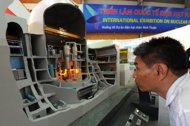Japan's TEPCO to drop nuclear exports: report

The turnaround by one of the world's largest utilities would be a blow to Japan's once-proud policy of promoting its nuclear technology, the Mainichi Shimbun daily said on Thursday.
Tokyo Electric, known as TEPCO, will withdraw from a scheme to supply and run two nuclear reactors at a plant in Vietnam, the paper said.
The project is being undertaken by International Nuclear Energy Development, a Tokyo-based company set up in 2010 by public funds, heavy machinery makers, and power companies including TEPCO, to promote nuclear power exports.
"Our atomic power engineers still need to do a lot more to stabilise and decommission the reactors" at the crippled Fukushima Daiichi plant, TEPCO president Naomi Hirose said Wednesday according to the Mainichi.
"It is impossible" to abandon the domestic task and promote exports, he was quoted as saying.
TEPCO had been expected to send engineers to the Vietnam plant for operations and maintenance while accepting Vietnamese engineers at its plants, according to Jiji Press news agency.
International Nuclear Energy Development said it had not been informed of any change of plan by TEPCO.
"We have confirmed with Tokyo Electric that it will continue to cooperate in the (Vietnam) project," said an official who declined to be named.
No immediate comment was available from TEPCO.
Tsunami-sparked meltdowns at Fukushima in March 2011 threw Japan into nuclear crisis as leaking reactors polluted vast areas of farmland and forced tens of thousands of people from their homes.
The clean-up is expected to take decades, with scientists warning that some settlements may have to be abandoned.
TEPCO posted a massive 781 billion yen net loss in the fiscal year to March on disaster-related costs, as well as increased imports of fossil fuels to make up for a nuclear power shortfall.
A boisterous shareholders' meeting on Wednesday rubber-stamped the effective nationalisation of the company.
What the stars mean:
★ Poor ★ ★ Promising ★★★ Good ★★★★ Very good ★★★★★ Exceptional
Related Contents
Latest News
More News
- State corporations poised to drive 2026 growth (February 03, 2026 | 13:58)
- Why high-tech talent will define Vietnam’s growth (February 02, 2026 | 10:47)
- FMCG resilience amid varying storms (February 02, 2026 | 10:00)
- Customs reforms strengthen business confidence, support trade growth (February 01, 2026 | 08:20)
- Vietnam and US to launch sixth trade negotiation round (January 30, 2026 | 15:19)
- Digital publishing emerges as key growth driver in Vietnam (January 30, 2026 | 10:59)
- EVN signs key contract for Tri An hydropower expansion (January 30, 2026 | 10:57)
- Vietnam to lead trade growth in ASEAN (January 29, 2026 | 15:08)
- Carlsberg Vietnam delivers Lunar New Year support in central region (January 28, 2026 | 17:19)
- TikTok penalised $35,000 in Vietnam for consumer protection violations (January 28, 2026 | 17:15)

 Tag:
Tag:




















 Mobile Version
Mobile Version